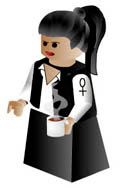(Teaching with your mouth shut is a book by Donald L. Finkel)
Thinking back over your whole life, what were the two or three most significant learning experiences you ever had? That is, list the moments (or events) in which you discovered something of lasting significance in your life.
Okay well the first part of this is easy: the one I talk about the most is Lorna Dee Cervantes' poetry reading at CU Boulder. In her poems she spoke a language that was familiar to me but devalued in the academy. I mean, obviously it was valued in a way, because here she was in the academy, but in my whole education--eighteen years at that point--I had never heard that language before in a classroom.
It's important for me to say that at that point I was not a high-identity Chicana :) I called myself Mexican, I was monolingual English, I liked reading Jane Austen and Georgette Heyer. I liked being the heroine in the book I was reading.
I was always confused about which generation I belong to--my mother was born in the LA, my grandmother and great grandmother immigrated in 1920 when the latter was about twenty and the former about seven, my great great grandmother immigrated when she was about 36 in 1912--and that's the *easy* side :)
Okay, that takes me to another big learning moment, which was when I was TA-ing for Bettina Aptheker and she had the students stand up and recite a maternal genealogy: I am Catriona, daughter of Eleanor, granddaughter of Guadalupe, great-granddaughter of Catalina, great-great granddaughter of Bernadette; I am Catriona, granddaughter of Libradita, great-granddaughter of Juanita. Now a big part of what I learned was in my verbalizing this, but another big part was hearing all the students doing this: It was like a big prayer, It started out strong (I Am) but with each successive generation, the voices were fewer. It was a lesson in what we didn't know and why. It was a feeling of both pride and failure. Each of us was proud of her heritage. Each of us was ashamed at how incomplete our knowledge of that heritage was, and how she had not noticed its absence.
Okay, final one. I learned that I was competitive, and ashamed of losing. This I learned through racewalking. I don't like to exercise. I don't like to sweat. but put me in a race with people walking fast and I'll sweat and push to get towards the front, to identify one person up ahead who i want to catch. in races that were primarily runners, where there would be 50 runners and 3 or 4 walkers, by definition I was going to be the back-of-the-pack. except there was no pack. I was all alone, and I felt a big degree of shame about walking--racing--by myself. but there was that heavy set man walking heel-toe, and if I could just pass him, then it would be a big deal.
1. Did it take place in a classroom?
2. Did it take place in a school?
3. Was a professional teacher involved in making the learning experience happen?
4. Was someone like a teacher (coach, director) involved in making the experience happen?
5. What did she do to help you learn?
6. What was instrumental in bringing about the learning?
My answers are a bit different than what Donald Finkel was leading toward, just because I have spent a truly amazing number of days in the classroom. :) But still, in none of those three learning situations was I the student in a class. The poetry reading I just went to, because I liked poetry, even though I wasn't sure exactly what that meant. I didn't learn content from Lorna Dee--it was experiential--I was weeping in that room.
jueves, septiembre 22, 2005
Teaching with your mouth shut
Posted by
Ktrion
at
8:33 a.m.
![]()
Suscribirse a:
Comentarios de la entrada (Atom)


No hay comentarios.:
Publicar un comentario